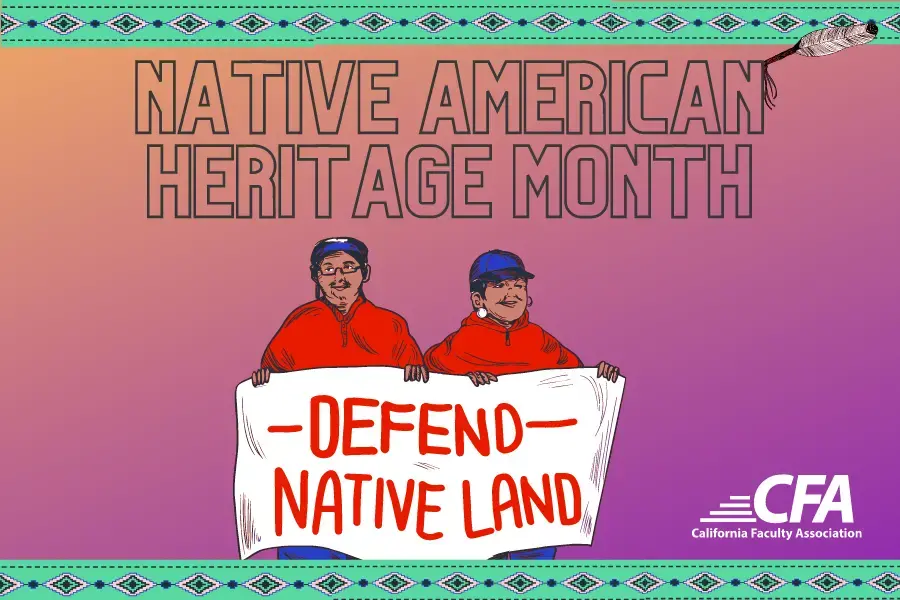Celebrating Native American Heritage Month
CFA members honor our Native and Indigenous friends and colleagues.
November is Native American Heritage Month, a time to learn “about tribes, to raise a general awareness about the unique challenges Native people have faced both historically and in the present, and the ways in which tribal citizens have worked to conquer these challenges,” according to the National Congress of American Indians.
At CFA, members of our Native American and Indigenous Peoples Caucus lead in our advocacy for and address issues affecting Native and Indigenous faculty, students, and staff across the CSU system and in higher education.

The Center for Indigenous Peoples Studies at CSU San Bernardino provides research and resources to explore topics like California Indians, news, and contemporary American Indian advocacy, like the voluntary land tax, a voluntary annual contribution that non-Indigenous people make to Native and Indigenous people for living on their lands.
CFA members can also uphold the teaching of the full and accurate history of the United States by supporting legislation, educators and curriculum that teach about racial injustices that continue to plague our society, and by educating the next generations while recognizing and celebrating our strength in diversity, similar to the National Congress of American Indians’ resolution.
Though the historic and genocidal oppression of Native tribes continues throughout what is referred to as the United States, there have been major strides by Native and Indigenous peoples and supporters of America’s tribal nations. According to Indian Country Today, last fall, the Cherokee Nation “led the way for what would turn out to be a series of historical lawsuits against America’s largest pharmaceutical distributors for their role in the opioid crisis and its effect on tribal communities across the country.”
This past election, for example, marked a major win for democracy led by Generation Z voters. And in Arizona, where Navajo, Apache, and Hopi voters helped swing 2020 for Democrats, that trend appeared to continue with major state and federal wins for liberal and progressive candidates despite Republicans restricting ballot access.
This year, President Biden acknowledged work that his administration has done for and with Native and Indigenous communities, like $13 billion for infrastructure projects in tribal communities, launching the Federal Indian Boarding School Initiative, and expanding grant programs to address climate change and renew protections for tribal monuments.
In Sacramento at the state Capitol, state and tribal officials broke ground on a statue of the late William Franklin Sr., a well-known Miwok tribal member who “worked to preserve the tribe culture, including its traditional dances,” according to NBC Bay Area.
And there may be additional news this year on a landmark case involving the Indian Child Welfare Act, which, according to some reports, may not be struck down by the conservative court.
Additionally during Thanksgiving, families can offer a land acknowledgment during their dinners – to reflect and acknowledge where we are as a society now and the ancestral lands we live on. Our work to honor the lands of our Native ancestors continues.
The holiday can be a time to reevaluate history and injustices done to Native and Indigenous Peoples across the country, including the history of the Wampanoag people and the effects of colonialism, disease, and war had on this Native people.
Join California Faculty Association
Join thousands of instructional faculty, librarians, counselors, and coaches to protect academic freedom, faculty rights, safe workplaces, higher education, student learning, and fight for racial and social justice.